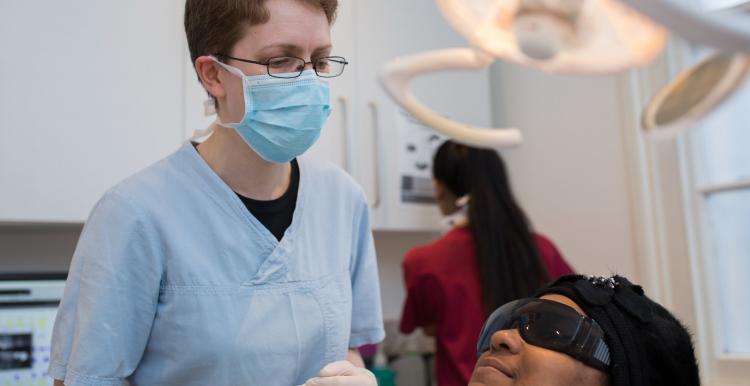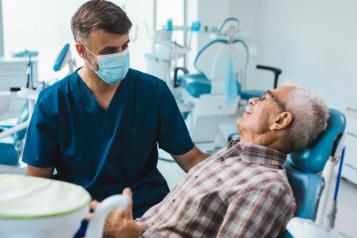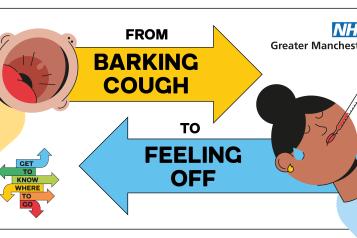Twin crisis of access and affordability calls for radical rethink of NHS dentistry

- Healthwatch England warns dental crisis shows no signs of slowing, with four in five people, 80%, struggling to access timely care during the last lockdown
- NHS dental charges causing public concern as 61% say they are expensive
- People on low incomes, those living in the North East and people from ethnic minority groups hardest hit by twin crisis of access and affordability
- Patients champion calls on NHS England and the Government to speed up reforms of NHS dentistry and radically improve access, reduce cost and avoid harm to people’s health.
The patients’ champion says the worrying trend of lack of access to NHS dental care continues as it recorded a 22% rise in calls and complaints about dentistry in the last lockdown.
A review of 1,375 people’s experiences shared with local Healthwatch found some people were asked to wait up to three years to get an NHS appointment, whilst private appointments were available within a week.
Whilst some people were charged £400 to get one tooth out, an individual reported being asked to pay over £7,000 for their dentures privately.
But private treatment is not an option for everyone, with many now struggling to pay even for NHS treatment. A separate poll of 2,019 adults commissioned by Healthwatch England found 61% of respondents felt that NHS dental treatments were expensive.
The poll, which looked at people’s experiences of NHS dentistry during the pandemic and how it has impacted their future habits, found that over a quarter (27%) of respondents said they either struggle to pay or avoid dental treatments altogether, because they cannot afford the costs.
NATIONAL DATA
- About one in three (30%) have reported they felt pressured into paying private fees to get all the dental treatment they needed. And nearly two in five (39%) reported that they have been charged extra for their NHS treatments.
- Nearly a quarter (23%) feel they will now visit the dentist only when they need treatment, despite clinical guidelines recommending regular dental check-ups to keep people’s mouths healthy.
- Demographic groups who have been affected the most by the lack of NHS dental appointments and NHS dental fees include people on low incomes and those from ethnic minority groups – the same groups who have been worst hit by the COVID-19 pandemic.
Reform of dentistry has been under way since 2009. Earlier this year it was announced that NHS England would be taking over the process from the Department of Health and Social Care, but reform plans have yet to be announced.
In a recent report on the future of the NHS, the Lancet Commission stressed ‘an absence of affordability is a major barrier to dental care’ and suggested an abolition of patients’ co-payments to access and receive dental care.
Healthwatch calls for greater ambition and urgency from NHS dental reform plans to create more equitable and affordable dental care.
Limited access to NHS dental care and a spiralling rise of private appointments mean many people are not able to access timely care – and the poorest are hardest hit. Those human stories show that oral health is a social justice and equity issue.
“Reform of dental contracts needs to be a matter of urgency for this Government. New arrangements should include making access to NHS dental services equal and affordable for everyone, regardless of where people live, their income and ethnicity. Failing to act now will result in long-term harm for thousands of people, putting even greater pressure on the already overstretched healthcare system.”
CASE STUDY
The impact on individuals
Gwen Leeming from Brighton has been suffering over the last couple of years with bad infections in two of her back teeth. She would take paracetamol and salt water to help her sore mouth and throat. After being told by her NHS dentist last autumn they are only open for private patients, it took her six months to see an NHS surgical dentist.
“I am a 72-year-old who has worked and paid National Insurance for over 50 years, so I can’t get health insurance any longer. As I live on limited income, which is supplemented by housing benefit, I can’t afford extra costs like private dental care.
I’m one of the many victims of our broken dental care system. It particularly is failing older patients who suffered (indeed still suffer) from the impact of 1960’s school dentists.”
Reliance on painkillers
Delays in access to dental care resulted in worsening of painful symptoms and even led to hospitalisation after an overdose of painkillers in one case. Where people couldn’t see a dentist, they were prescribed antibiotics with no provision for a follow-up appointment to get treated. Repeated use of antibiotics can make individuals resistant to the drug which can have implications on their future health.
“I have been trying to get a dentist for three years, last week I ended up in hospital for three days because I had severe pain and could not find a dentist for emergencies or otherwise to fix my teeth. I ended up taking too many paracetamol and had to go to A&E on the advice of [NHS]111. I ended up on a drip for 36 hours and have finally come home. I still do not have a dentist and I am still in pain.” [Healthwatch Suffolk, 12/03/21]
Income and regional disparities
Almost twice as many people from lower socio-economic groups (SEG) D and E struggle or can’t afford to pay NHS dental charges (37%) than people from higher socio-economic group, A, (19%). As a result, people from SEG D and E are also twice as likely to avoid dental care due to affordability issues.
People living in the North East of England are the most likely to avoid NHS dental treatment due to costs (13%), compared with just one in 30 (3%) who live in the South West. Despite this, people in the North East have been charged for NHS dental treatments the most (29%), while people in the South West were charged the least (13%).
People from ethnic minority groups
Just over a quarter of people from ethnic minority communities (26%) reported they would go to dentist for regular check-ups, compared to two in five (41%) of white people. In fact, people over 55 from ethnic minority groups who are on low incomes are six times more likely to avoid dental treatments due to costs than their white counterparts.


